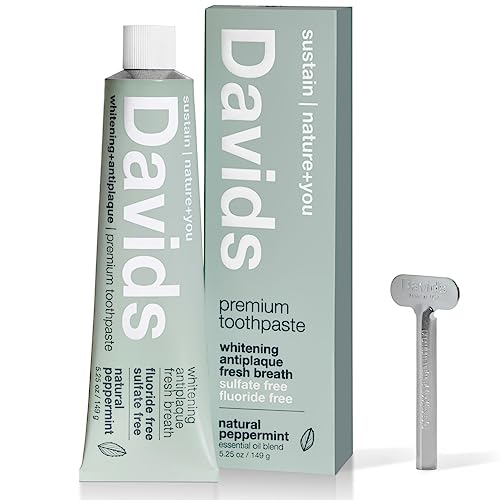
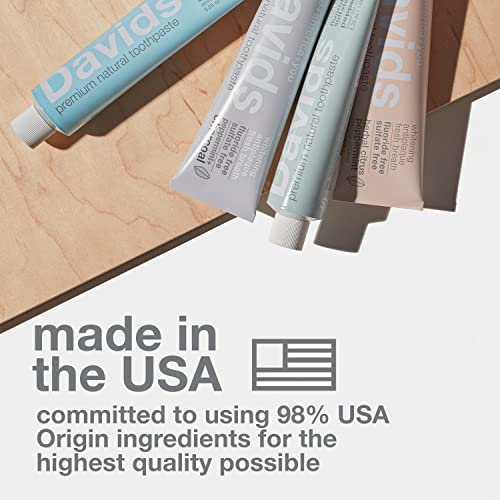
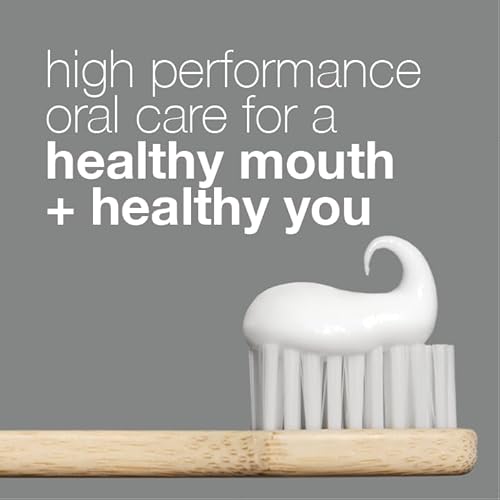
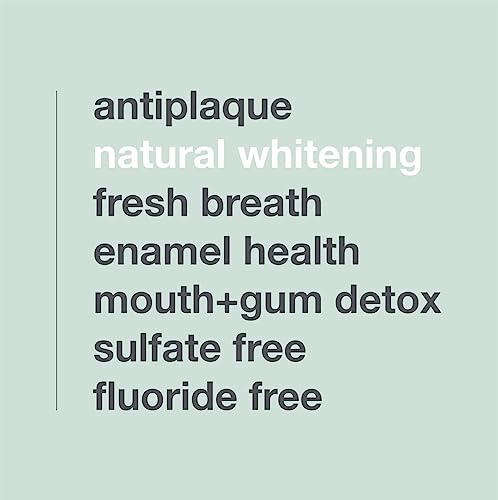
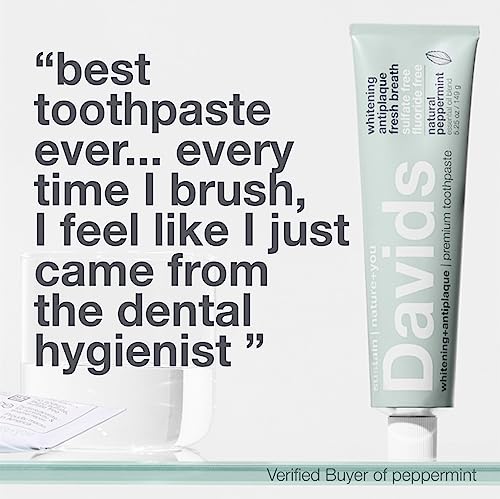

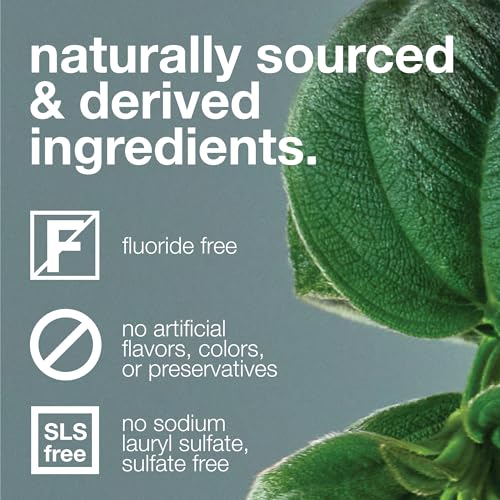
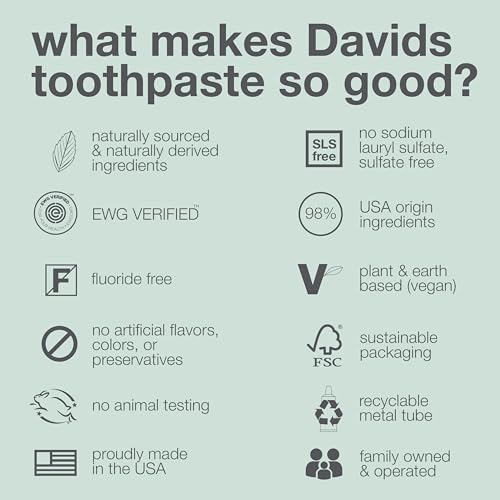
Davids Natural Toothpaste - Fluoride-Free, Antiplaque, Vegan, Peppermint - 5.25oz Metal Tube


Pimpinella Anisum (Anise) Seed Extract
High RiskPimpinella anisum (anise) seed extract is an essential oil derived from the seeds of the anise plant, commonly used for its aromatic properties in cosmetic and personal care products. It serves various functions, including fragrance, flavoring, and potential preservative effects.
Sustai Insights
Pimpinella anisum (anise) seed extract has functional benefits as a flavoring agent and fragrance enhancer in products. However, it carries a high allergenic potential, posing a risk for sensitized individuals. While it is generally low-risk for carcinogenicity and developmental toxicity, regulatory bodies have imposed restrictions on its use in certain formulations. Overall, the ingredient is assessed to have a high risk due to allergy concerns, warranting cautious use, especially for sensitive populations. Alternatives such as other botanical extracts may offer safer profiles.
Picea Mariana Leaf Oil
High RiskPicea mariana leaf oil, derived from the needles of the black spruce tree, is commonly used in personal care products for its aromatic properties and potential skin benefits. It functions primarily as a fragrance component and may also have preservative qualities due to its natural antimicrobial properties.
Sustai Insights
Picea mariana leaf oil offers functional benefits as a natural fragrance and potential antimicrobial agent, which can enhance product stability. However, it carries high usage restrictions and is associated with low risk for carcinogenicity, allergies, and reproductive toxicity. Environmental concerns include potential pollution and bioaccumulation. Regulatory warnings indicate heightened caution in use. Overall, the ingredient presents a high risk assessment, and users are advised to consider safer alternatives or limit exposure.
Calcite
Low RiskCalcite is a mineral primarily made up of calcium carbonate (CaCO3). It is commonly found in sedimentary rocks and is used in various applications, including construction, agriculture, and as a filler in products due to its whiteness and brightness.
Sustai Insights
Calcite offers functional benefits such as acting as a filler and providing opacity in products. It is sustainably sourced and biodegradable. Health risks are minimal, with low concerns regarding carcinogenicity, allergies, and reproductive toxicity. Environmental risks are also low, as calcite does not contribute significantly to pollution or bioaccumulation. Regulatory bodies do not impose restrictions on its use, affirming its safety. Overall, the risk level associated with calcite is low, making it a safe ingredient in various applications.
Mentha Piperita (Peppermint) Oil Extract
Low RiskMentha piperita (peppermint) oil extract is derived from the peppermint plant and is commonly used in various products for its aromatic and flavoring properties. It serves multiple functions, including acting as a fragrance agent and providing a cooling sensation in topical applications.
Sustai Insights
Mentha piperita oil offers functional benefits such as flavor enhancement and a refreshing aroma, while it is generally recognized as low risk for health concerns, including carcinogenicity and allergies. Environmentally, it does not contribute significantly to pollution or bioaccumulation. Regulatory bodies do not impose restrictions on its use. Safe usage practices include avoiding excessive exposure, particularly for sensitive individuals. Alternatives like spearmint oil may be considered, but overall, this ingredient is assessed as low risk.
Sodium Cocoyl Glutamate
Low RiskSodium cocoyl glutamate is a sodium salt of glutamic acid, derived from coconut oil. It serves primarily as a surfactant and mild cleansing agent in cosmetic formulations, contributing to the product's ability to remove dirt and oil while being gentle on the skin.
Sustai Insights
Sodium cocoyl glutamate offers functional benefits as a surfactant, enhancing cleansing efficacy without excessive irritation. It is considered low risk regarding health concerns, including carcinogenicity and allergenic potential. Regulatory assessments indicate no significant environmental hazards or restrictions. Overall, it is a low-risk ingredient, suitable for use in personal care products, with no notable adverse effects or regulatory warnings.
Sodium Bicarbonate
Low RiskSodium bicarbonate, commonly known as baking soda, is an inorganic compound with the formula NaHCO₃. It functions primarily as a leavening agent in baking, helping to produce carbon dioxide gas when it reacts with acids, thereby causing dough to rise. It also serves as a mild alkaline agent in various personal care products.
Sustai Insights
Sodium bicarbonate is valued for its effectiveness as a leavening agent and its role in neutralizing acidity, contributing to product stability. It is considered environmentally friendly and biodegradable. Health risks are minimal, with low concerns regarding carcinogenicity, allergies, and reproductive toxicity. It is not classified as a pollutant and poses no significant environmental hazards. Regulatory assessments indicate it is safe for use in food and cosmetic products. Overall, sodium bicarbonate carries a low risk, making it a practical choice in many applications.
Chondrus Crispus (Carrageenan)
Low RiskChondrus crispus, commonly known as carrageenan, is a gelatinous polysaccharide derived from red algae. It is primarily used as a thickening, stabilizing, and gelling agent in food, cosmetics, and pharmaceuticals, providing texture and consistency to various products.
Sustai Insights
Carrageenan offers functional benefits such as effective thickening and stabilizing properties, making it valuable in food and cosmetic formulations. It is considered to have low health risk concerns regarding carcinogenicity, allergies, and reproductive toxicity, though moderate concerns exist for non-reproductive organ toxicity. Environmental impacts are minimal, as it is not known to be bioaccumulative or a significant pollutant. Regulatory bodies have not issued specific restrictions against its use, affirming a low overall risk assessment for this ingredient. Alternatives like agar-agar or pectin may be considered for those seeking substitutes.
Hydrated Silica
Low RiskHydrated silica is a form of silicon dioxide that appears as a fine, white powder. It is commonly used in cosmetic products for its thickening, anti-caking, and absorbent properties, enhancing product texture and stability.
Sustai Insights
Hydrated silica serves as an effective thickening agent and absorbent, contributing to product stability. It has a low potential for health risks, with minimal concerns regarding carcinogenicity, allergies, or reproductive toxicity. Environmental risks are also low, with no significant bioaccumulation or pollution concerns. Regulatory bodies do not impose major restrictions, classifying it as low-risk overall. For safe usage, it is recommended to follow product instructions. Alternatives include more natural thickeners like xanthan gum for sustainable formulations.
Xylitol
Low RiskXylitol is a sugar alcohol used primarily as a sweetener. It is commonly found in oral care products and food items, offering a sweetening effect similar to sugar but with fewer calories. It serves as a humectant and can contribute to dental health by reducing the risk of cavities.
Sustai Insights
Xylitol provides functional benefits as a low-calorie sweetener and may help improve dental health by inhibiting cavity-causing bacteria. It is generally recognized as safe by the FDA with low concern for cancer, allergies, or reproductive toxicity. Environmental risks are minimal, as xylitol is biodegradable and does not accumulate in the ecosystem. Regulatory bodies have not imposed significant restrictions. Overall, xylitol presents a low risk when used appropriately, with no major adverse health effects reported and sustainable sourcing options available.
Gaultheria Procumbens (Wintergreen) Oil
Low RiskGaultheria procumbens (wintergreen) oil is an essential oil derived from the leaves of the wintergreen plant. It is primarily used for its aromatic properties and as a natural flavoring agent. Its main component, methyl salicylate, is known for its analgesic and anti-inflammatory effects, making it popular in topical applications for muscle and joint relief.
Sustai Insights
Wintergreen oil offers functional benefits such as pain relief and flavoring, and it is typically sourced sustainably. Health risks are minimal, with low concerns for carcinogenicity, allergies, and reproductive toxicity. Environmental risks are also low, with no significant pollution or bioaccumulation noted. Regulatory bodies do not impose restrictions on its use. Overall, wintergreen oil presents a low-risk profile, making it a suitable ingredient in various products.
Calcite
Low RiskCalcite is a mineral primarily made up of calcium carbonate (CaCO3). It is commonly found in sedimentary rocks and is used in various applications, including construction, agriculture, and as a filler in products due to its whiteness and brightness.
Sustai Insights
Calcite offers functional benefits such as acting as a filler and providing opacity in products. It is sustainably sourced and biodegradable. Health risks are minimal, with low concerns regarding carcinogenicity, allergies, and reproductive toxicity. Environmental risks are also low, as calcite does not contribute significantly to pollution or bioaccumulation. Regulatory bodies do not impose restrictions on its use, affirming its safety. Overall, the risk level associated with calcite is low, making it a safe ingredient in various applications.
Mentha Piperita (Peppermint) Oil Extract
Low RiskMentha piperita (peppermint) oil extract is derived from the peppermint plant and is commonly used in various products for its aromatic and flavoring properties. It serves multiple functions, including acting as a fragrance agent and providing a cooling sensation in topical applications.
Sustai Insights
Mentha piperita oil offers functional benefits such as flavor enhancement and a refreshing aroma, while it is generally recognized as low risk for health concerns, including carcinogenicity and allergies. Environmentally, it does not contribute significantly to pollution or bioaccumulation. Regulatory bodies do not impose restrictions on its use. Safe usage practices include avoiding excessive exposure, particularly for sensitive individuals. Alternatives like spearmint oil may be considered, but overall, this ingredient is assessed as low risk.
Pimpinella Anisum (Anise) Seed Extract
High RiskPimpinella anisum (anise) seed extract is an essential oil derived from the seeds of the anise plant, commonly used for its aromatic properties in cosmetic and personal care products. It serves various functions, including fragrance, flavoring, and potential preservative effects.
Sustai Insights
Pimpinella anisum (anise) seed extract has functional benefits as a flavoring agent and fragrance enhancer in products. However, it carries a high allergenic potential, posing a risk for sensitized individuals. While it is generally low-risk for carcinogenicity and developmental toxicity, regulatory bodies have imposed restrictions on its use in certain formulations. Overall, the ingredient is assessed to have a high risk due to allergy concerns, warranting cautious use, especially for sensitive populations. Alternatives such as other botanical extracts may offer safer profiles.
Sodium Cocoyl Glutamate
Low RiskSodium cocoyl glutamate is a sodium salt of glutamic acid, derived from coconut oil. It serves primarily as a surfactant and mild cleansing agent in cosmetic formulations, contributing to the product's ability to remove dirt and oil while being gentle on the skin.
Sustai Insights
Sodium cocoyl glutamate offers functional benefits as a surfactant, enhancing cleansing efficacy without excessive irritation. It is considered low risk regarding health concerns, including carcinogenicity and allergenic potential. Regulatory assessments indicate no significant environmental hazards or restrictions. Overall, it is a low-risk ingredient, suitable for use in personal care products, with no notable adverse effects or regulatory warnings.
Sodium Bicarbonate
Low RiskSodium bicarbonate, commonly known as baking soda, is an inorganic compound with the formula NaHCO₃. It functions primarily as a leavening agent in baking, helping to produce carbon dioxide gas when it reacts with acids, thereby causing dough to rise. It also serves as a mild alkaline agent in various personal care products.
Sustai Insights
Sodium bicarbonate is valued for its effectiveness as a leavening agent and its role in neutralizing acidity, contributing to product stability. It is considered environmentally friendly and biodegradable. Health risks are minimal, with low concerns regarding carcinogenicity, allergies, and reproductive toxicity. It is not classified as a pollutant and poses no significant environmental hazards. Regulatory assessments indicate it is safe for use in food and cosmetic products. Overall, sodium bicarbonate carries a low risk, making it a practical choice in many applications.
Chondrus Crispus (Carrageenan)
Low RiskChondrus crispus, commonly known as carrageenan, is a gelatinous polysaccharide derived from red algae. It is primarily used as a thickening, stabilizing, and gelling agent in food, cosmetics, and pharmaceuticals, providing texture and consistency to various products.
Sustai Insights
Carrageenan offers functional benefits such as effective thickening and stabilizing properties, making it valuable in food and cosmetic formulations. It is considered to have low health risk concerns regarding carcinogenicity, allergies, and reproductive toxicity, though moderate concerns exist for non-reproductive organ toxicity. Environmental impacts are minimal, as it is not known to be bioaccumulative or a significant pollutant. Regulatory bodies have not issued specific restrictions against its use, affirming a low overall risk assessment for this ingredient. Alternatives like agar-agar or pectin may be considered for those seeking substitutes.
Hydrated Silica
Low RiskHydrated silica is a form of silicon dioxide that appears as a fine, white powder. It is commonly used in cosmetic products for its thickening, anti-caking, and absorbent properties, enhancing product texture and stability.
Sustai Insights
Hydrated silica serves as an effective thickening agent and absorbent, contributing to product stability. It has a low potential for health risks, with minimal concerns regarding carcinogenicity, allergies, or reproductive toxicity. Environmental risks are also low, with no significant bioaccumulation or pollution concerns. Regulatory bodies do not impose major restrictions, classifying it as low-risk overall. For safe usage, it is recommended to follow product instructions. Alternatives include more natural thickeners like xanthan gum for sustainable formulations.
Xylitol
Low RiskXylitol is a sugar alcohol used primarily as a sweetener. It is commonly found in oral care products and food items, offering a sweetening effect similar to sugar but with fewer calories. It serves as a humectant and can contribute to dental health by reducing the risk of cavities.
Sustai Insights
Xylitol provides functional benefits as a low-calorie sweetener and may help improve dental health by inhibiting cavity-causing bacteria. It is generally recognized as safe by the FDA with low concern for cancer, allergies, or reproductive toxicity. Environmental risks are minimal, as xylitol is biodegradable and does not accumulate in the ecosystem. Regulatory bodies have not imposed significant restrictions. Overall, xylitol presents a low risk when used appropriately, with no major adverse health effects reported and sustainable sourcing options available.
Gaultheria Procumbens (Wintergreen) Oil
Low RiskGaultheria procumbens (wintergreen) oil is an essential oil derived from the leaves of the wintergreen plant. It is primarily used for its aromatic properties and as a natural flavoring agent. Its main component, methyl salicylate, is known for its analgesic and anti-inflammatory effects, making it popular in topical applications for muscle and joint relief.
Sustai Insights
Wintergreen oil offers functional benefits such as pain relief and flavoring, and it is typically sourced sustainably. Health risks are minimal, with low concerns for carcinogenicity, allergies, and reproductive toxicity. Environmental risks are also low, with no significant pollution or bioaccumulation noted. Regulatory bodies do not impose restrictions on its use. Overall, wintergreen oil presents a low-risk profile, making it a suitable ingredient in various products.
Picea Mariana Leaf Oil
High RiskPicea mariana leaf oil, derived from the needles of the black spruce tree, is commonly used in personal care products for its aromatic properties and potential skin benefits. It functions primarily as a fragrance component and may also have preservative qualities due to its natural antimicrobial properties.
Sustai Insights
Picea mariana leaf oil offers functional benefits as a natural fragrance and potential antimicrobial agent, which can enhance product stability. However, it carries high usage restrictions and is associated with low risk for carcinogenicity, allergies, and reproductive toxicity. Environmental concerns include potential pollution and bioaccumulation. Regulatory warnings indicate heightened caution in use. Overall, the ingredient presents a high risk assessment, and users are advised to consider safer alternatives or limit exposure.
Discover Davids Natural Toothpaste, a fluoride-free, peppermint-flavored formula designed for effective teeth whitening and plaque reduction. This eco-friendly toothpaste comes in a recyclable metal tube, promoting sustainability and enhancing your oral care routine.
- Fluoride-Free Formula: Replaces harsh chemicals with natural ingredients to effectively eliminate plaque and whiten teeth safely.
- Gentle Whitening: Micro polishing agents safely remove surface stains without causing sensitivity, ensuring enamel safety with daily use.
- Oral Health Enhancement: Restores PH balance and supports your mouth's natural microbiome, leaving a clean, minty fresh feeling.
- Clean and Natural Ingredients: Vegan, sulfate-free, and EWG verified, containing no artificial flavors, colors, or preservatives.
- Sustainable Packaging: The recyclable metal tube minimizes plastic waste; a squeezer is included for easy dispensing, making it a smart choice for the planet.
Subscribe & Save with Sustai
- Best Price Guarantee: Always enjoy the lowest prices on sustainable home essentials.
- No Surprises: We’ll notify you before shipping. No hidden fees, ever.
- You’re in Charge: Change, pause, or cancel your subscription anytime with ease.
- Eco-Friendly Deliveries: Our grouped shipments mean less packaging and lower emissions.
Join us on a sustainable journey. Special offers for a limited time! Prices and promotions may change.
Recommended Products
Discover Davids Natural Toothpaste, a fluoride-free, peppermint-flavored formula designed for effective teeth whitening and plaque reduction. This eco-friendly toothpaste comes in a recyclable metal tube, promoting sustainability and enhancing your oral care routine.
- Fluoride-Free Formula: Replaces harsh chemicals with natural ingredients to effectively eliminate plaque and whiten teeth safely.
- Gentle Whitening: Micro polishing agents safely remove surface stains without causing sensitivity, ensuring enamel safety with daily use.
- Oral Health Enhancement: Restores PH balance and supports your mouth's natural microbiome, leaving a clean, minty fresh feeling.
- Clean and Natural Ingredients: Vegan, sulfate-free, and EWG verified, containing no artificial flavors, colors, or preservatives.
- Sustainable Packaging: The recyclable metal tube minimizes plastic waste; a squeezer is included for easy dispensing, making it a smart choice for the planet.

You can have at most 2 Sustainable Steals products in your cart
Customer Reviews
Customers’ View
Customers appreciate the effectiveness and eco-friendly nature of this fluoride-free toothpaste, noting its pleasant taste and natural ingredients. Many highlight its ability to clean teeth thoroughly, with one user mentioning a noticeable improvement in mouth freshness. The recyclable metal tube is also praised for reducing plastic waste, and the included squeezer ensures efficient use of the product. While some customers express mixed feelings about value for money and durability, the overall sentiment reflects satisfaction with the product's quality and alignment with health-conscious choices. Overall, customers find this toothpaste to be a solid option that supports their sustainable lifestyle.
AI-generated from the text of customer reviewsThis product has no reviews yet.





